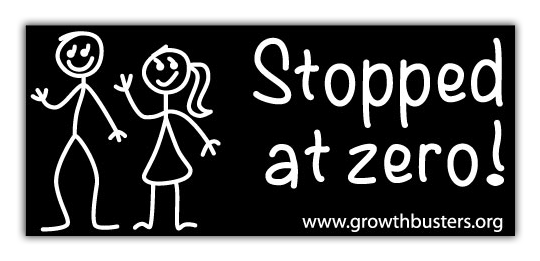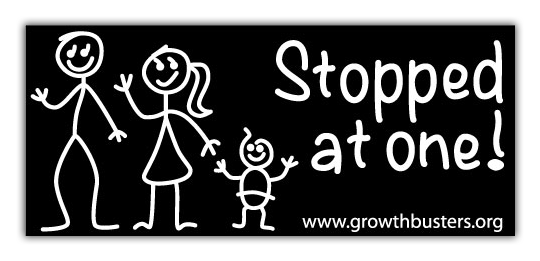
89: Bezos: We’re Going to Need Another Planet
Amazon billionaire Jeff Bezos thinks the U.S. can grow its way out of a massive deficit. He says we need a “growth mindset.” Stephanie and Dave call it a “suicide economic model,” and note that growth addiction is exactly what afflicts most policymakers around the world. The dynamic duo discuss the little-understood fact that a shrinking economy can be healthy – when it accompanies a contracting population.
 Bezos also proposes that we plunder the universe in order to protect Earth “we’ve sent robotic probes to all of the planets in this solar system. This is the good one.”)
Bezos also proposes that we plunder the universe in order to protect Earth “we’ve sent robotic probes to all of the planets in this solar system. This is the good one.”)
Also:
The Congressional Budget Office lowers U.S. population projections, further stoking the fires of depopulation panic – the result of a lack of overpopulation literacy
Isaac Asimov’s “metaphor of the bathroom,” about the need for more regulation as our population grows (we dug up great video of Asimov; see link below)
The parable of the Mexican fisherman
A great poem, Rather Than by Sandy Trust. Featured in an episode of one of our favorite podcasts, Planet Critical (see link below)
MENTIONED IN THIS EPISODE
Congressional Budget Office Lowers U.S. Population Projections
Immigrants Fill the Birth Dearth: U.S. Population Will Crater Without Newcomers – New York Daily News editorial
The Interview: From Amazon to Space — Jeff Bezos Talks Innovation, Progress and What’s Next – 2024 New York Times DealBook Summit, with Andrew Ross Sorkin
The Four Hour Work Week – by Tim Ferriss
The Story of the Mexican Fisherman A blog post on the website of Courtney Carver, author of Soulful Simplicity: How Living with Less Can Lead to So Much More, and Gentle: Rest More, Stress Less, and Live the Life You Actually Want
Isaac Asimov on World of Ideas – 1988 Interview by Bill Moyers
Planetary Solvency – Finding Our Balance With Nature – report by Institute and Faculty of Actuaries
Planetary Solvency: Sandy Trust – episode of Planet Critical with Rachel Donald Sandy Trust responds to one question with his poem, Rather Than
Give Us Feedback:- Record a voice message for us to play on the podcast: 719-402-1400
- Send an email to podcast at growthbusters.org
The GrowthBusters theme song was written and produced by Jake Fader and sung by Carlos Jones.
On the GrowthBusters podcast, we come to terms with the limits to growth, explore the joy of sustainable living, and provide a recovery program from our society’s growth addiction (economic/consumption and population). This podcast is part of the GrowthBusters project to raise awareness of overshoot and end our culture’s obsession with, and pursuit of, growth.
Dave Gardner directed the documentary GrowthBusters: Hooked on Growth, which Stanford Biologist Paul Ehrlich declared “could be the most important film ever made.” Co-host, and self-described “energy nerd,” Stephanie Gardner has degrees in Environmental Studies and Environmental Law & Policy.
Join the GrowthBusters online community
GrowthBusters: Hooked on Growth – free on YouTube
Join the conversation on Facebook
Make a donation to support this non-profit project.Archive of GrowthBusters podcast episodes
Subscribe to GrowthBusters email updates
Explore the issues right here, at growthbusters.org
View the GrowthBusters channel on YouTube
Follow on your podcast app so you don’t miss an episode:
Tags: depopulation panic, economic growth, growth addiction, overpopulation
Trackback from your site.




Gaia Baracetti
| #
Hi, long time listener here.
I wanted to weigh in on the topic of regulation because I think that Stephanie has a naive view of it. I live in the EU and we definitely do have too much regulation; it’s making a lot of people frustrated and miserable. Contrary to what she says, regulation can be the enemy of sustainability.
Of course, you do need rules. No society has no rules. But there are several problems with an excess of regulation, which I will try to summarise here:
– people lose autonomy over their own lives. When you have to ask permission for everything, you cannot make your own choices, and powerful bureaucrats, private companies and politicians have more power over yourself than you do, that creates a lack of freedom in a very deep sense. It also makes these people very arrogant, because they can destroy you easily with a prohibition or a fine, so you are afraid of them and let them treat you badly
– regulation makes living with less much more difficult. Especially if you don’t want to be an employee and want to have a small, sustainable activity of your own. You have to get certificates for everything, and they cost money; you pay fines for even small errors in good faith, you need to spend a lot of time on paperwork… all of this means you need to work more and earn more, go big or fail. Last year, when I counted my expenses and income for my very small farming operation, most expenses were bureaucracy and taxes. Taxes I accept, but the rest was just propping up a parasitic system. I almost had no input expenses, that’s how sustainable I was, but I wasn’t making any money to survive because of regulation and associated costs
– regulation helps big business and creates artificial economies of scale. Following rules has a cost, a cost that is often fixed, not a percentage; the bigger you are, the more you can absorb it. Sometimes, you simply cannot comply, it would cost too much money or labour, so you give up. This is actually deliberate, to push the small people out of business. I’ve even been told explicitly that I wasn’t allowed to do certain things myself because that would be “unfair competition” with big businesses doing the same
– most regulation is bottom-down, and the people making decisions don’t have all the information, while reality varies a lot on the ground. There is a long list of minute rules made to help the environment, that ended up doing more damage than traditional practices adapted to local conditions. I know of regulations for animal welfare that end up making animals suffer more
– regulation creates office jobs that are parasitic; people who are actually productive then need to work more to support these other people. This is true for hospitals, schools, municipalities, everything. So you need to spend more on, say, healthcare, because you have to pay people in offices doing useless paperwork while the actual doctors are too few and overworked
All of this comes from personal experience – you don’t know how bad it is until you find yourself in this situation. Regulations sound very good on paper, until you are the one who has to follow them in practice.
Like I said: some rules are necessary and good. But there’s too many of them.
I’ll give you a very small example for a US audience: eggs. Eggs are expensive – as they should be, because food shouldn’t be too cheap. But people also need to eat. There’s a solution: keep hens at home. But many regulations prohibit it. It’d be fair to have inspectors making sure you’re not keeping animals in unsanitary or cruel conditions, sure, but why are we prohibiting it outright? So that the big awful chicken factories keep making money and keep being your only choice for food. You try making your own, they shut you down.
Not the best example, but you get the idea. The growth of bureaucracy is one of the bad types of growth we need to push back against.
Thanks for reading
Gaia
Reply
Dave Gardner
| #
Thank you very much for your detailed comments. We hope to share your thoughts on a future episode and respond to them.
Reply